Supreme Court seems open to tossing charge used to convict Capitol rioters from KS, MO
- Oops!Something went wrong.Please try again later.
The U.S. Supreme Court on Tuesday appeared willing to scrap a felony charge brought against hundreds of people who stormed the Capitol on Jan. 6, 2021, to disrupt the certification of the 2020 presidential election.
The charge — that some defendants obstructed an official proceeding when the mass of people in the Capitol forced Congress to evacuate and delay its proceedings for around seven hours — is from a 2002 law written after accounting scandals at major U.S. corporations in the late 1990s and early 2000s.
Three men charged for their role in the attack on the Capitol have argued that the law was not intended to be used when people physically disrupt Congress. Instead, they argue, it’s limited to the destruction of records and documents, because the provision was written in response to an Enron auditor’s decision to destroy potentially incriminating documents about the company’s widespread fraud.
The six conservative justices on Tuesday appeared open to the argument that the government had misused the statute when it applied it to some of the rioters who stormed the Capitol on Jan. 6. Several justices expressed concern that the provision could be used to prosecute smaller acts of protest against the government.
Justice Brett Kavanaugh, a Trump appointee, said the key was how much Congress intended the clause to cover when it used the word “otherwise.” He asked why the government needed the charge when it was often able to bring other indictments against Jan. 6 defendants.
“Obviously, petitioner committed other crimes that we’ve charged and that we’re seeking to hold him accountable for,” said Elizabeth B. Prelogar, the Solicitor General. “But one of the distinct strands of harm, one of the root problems with petitioners conduct, is that he knew about that proceeding, he said in advance of Jan. 6 that he was prepared to storm the Capitol, prepared to use violence, he wanted to intimidate Congress. He said they can’t vote if they can’t breathe.”
But the liberal justices grilled Jeffrey T. Green, the attorney for Fischer, on his narrow argument of when the charge should be brought, saying Congress intended to cover any gaps in the statute that could be exploited. Justice Elena Kagan, an Obama appointee, said Congress specifically created the charge as a backstop.
Green said the backstop was only intended to catch crimes that were not specifically spelled out in the first part of the statute, like falsely creating a court document. He said the government’s use of the charge is too far reaching.
“The government wants to unleash a 20 year maximum penalty on potential peaceful protests,” Green said. “That in and of itself is a bad idea because it’s going to chill protected activities. People are going to worry about the kinds of protests they engage in, even if they’re peaceful, because the government has this kind of weapon.”
The decision, expected to come in late June, could have significant implications. According to the U.S. Department of Justice, more than 353 of the 1,387 Capitol riot defendants have been charged with obstruction of an official proceeding, a felony that carries a maximum sentence of 20 years in prison.
At least 119 of them have been both convicted and sentenced, including William Chrestman from Kansas. And three others who traveled from Kansas and Missouri to Washington have been convicted and are awaiting their sentence.
Already, the Supreme Court’s decision to hear the case is affecting other Jan. 6 cases. Some judges in the U.S. District Court for the District of Columbia have delayed sentencing Jan. 6 defendants until after the Supreme Court issues a ruling. One Missouri defendant, Nicholas Kennedy, opted to have a stipulated trial for an obstruction charge in the hopes that the Supreme Court will overturn the charge and he can appeal the judge’s ruling.
The case has been working its way through the courts since March 2022, when District Court Judge Carl Nichols, a Trump appointee, dismissed the government’s obstruction charge against Garret Miller. He said the charge only applied if the defendant took “some action with respect to a document, record, or other object in order to corruptly obstruct, impede or influence an official proceeding,” citing that interpretation as closest to the original legislative intent of Congress.
Nichols also dismissed the obstruction counts against two other Capitol riot defendants, Joseph Fischer and Edward Lang.
A three-judge panel in the U.S. Court of Appeals for the District of Columbia Circuit, all appointed by Democratic presidents, reversed the District Court opinion, saying the text was “unambiguous” in that it extended beyond the destruction of records. The three defendants then appealed that decision to the Supreme Court.
The case, called Fischer v. United States, comes a week ahead of arguments over whether former President Donald Trump has immunity from legal arguments that he broke the law in trying to overturn the results of the 2020 election, because he was serving as president at the time.
Trump has come to increasingly embrace his supporters who stormed the Capitol on Jan. 6. At some of his campaign rallies, Trump has played a version of the national anthem sung by Jan. 6 defendants who are held in a D.C. jail ahead of their trials. Trump, and some Republicans, have taken to calling the defendants “patriots,” “political prisoners” and “hostages.”
The former president said on his Truth Social account last month that one of his first acts if re-elected would be to “Free the January 6 Hostages being wrongfully imprisoned!”
Former Missouri Sen. John Danforth filed an amicus brief in the case with several former elected officials and judges, which argued that the 2002 law should apply to the Capitol riot cases because it specifically applies to anyone who “otherwise” obstructs an official proceeding. It also says the courts have a strong incentive to punish the people who stormed the Capitol that day.
“I think January 6 matters,” Danforth told The Star in an interview. “I think January 6 was a major event in American history. I think that January 6 was not just an attack on a building, it was an attack of the peaceful transfer of power and something that is absolutely essential to our country.”
Roger Roots, one of the attorneys representing Blue Springs defendant John George Todd, said the obstruction statute has nothing to do with the actions of those on Jan. 6. Todd is awaiting a May 10 sentencing after a jury found him guilty in February of six charges, including obstruction of an official proceeding.
The statute “was plainly intended by Congress to apply to the most serious instances of obstruction of a proceeding’s ability to evaluate evidence or come to proper findings,” Roots said in an email to The Star. “That might mean submitting fraudulent information, fabricating documents or bribing witnesses.
“The statute was not intended to punish people’s political advocacy at the U.S. Capitol. The U.S. Capitol is one of America’s largest public buildings and is designed to facilitate political dialogue and protest,” he said.
Several Kansas and Missouri defendants are among those whose cases could be impacted if the Supreme Court overturns the D.C. Circuit decision. Nine in those two states were charged with obstruction of an official proceeding.
The charges against four of them were dismissed as part of their plea agreements. Four others were convicted on the obstruction and other charges: Todd; Kennedy, of Sikeston; Matthew Loganbill, of Versailles; and Chrestman, of Olathe.
The other defendant, William Pope, of Topeka, has a jury trial scheduled for July 22.
Chrestman is the only one to be sentenced so far. Todd’s sentencing is set for May 10, and Kennedy’s is Aug. 28. Loganbill’s sentencing has been delayed until after the Fischer decision comes down.
Chrestman, a member of the far-right Proud Boys Kansas City chapter, was arrested Feb. 11, 2021, and faced multiple felony charges. He was indicted Feb. 26, 2021, along with Ryan Ashlock, Louis Enrique Colon, Christopher Kuehne and Arizona siblings Cory and Felicia Konold for conspiring to breach the Capitol on Jan. 6.
Prosecutors said Chrestman, an Army veteran, threatened to assault a federal law enforcement officer and carried a wooden ax handle while in the Capitol building and on the grounds. He could be seen on numerous videos alongside other Proud Boys during the insurrection, dressed in tactical gear, leading chants and wielding the ax handle inside the Capitol.
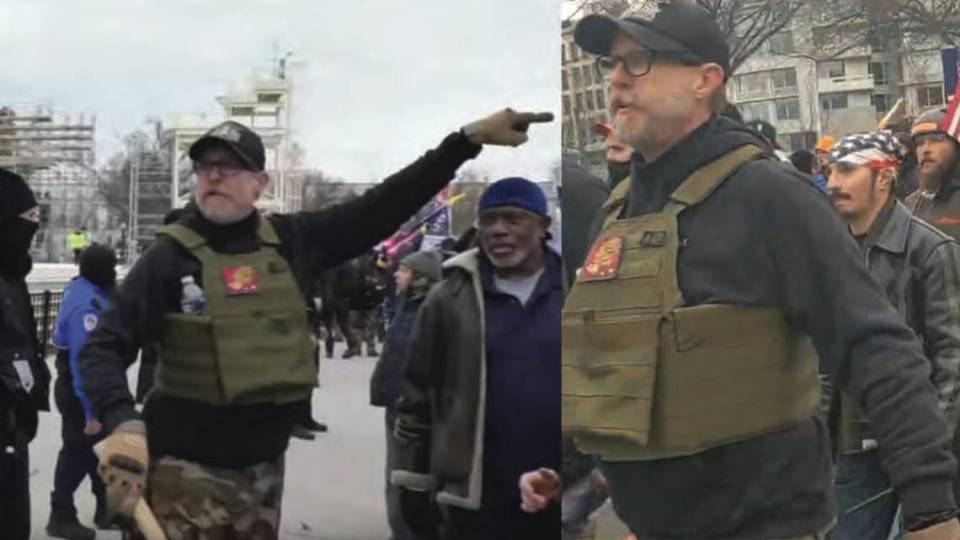
Chrestman was held without bond in the D.C. jail. He pleaded guilty on Oct. 16 to obstruction of an official proceeding and threatening a federal officer and was sentenced on Jan. 12, 2024, to 55 months in prison, three years of supervised release and $2,000 restitution. He was given credit for the nearly three years of time already served. Prison records show he is being held at the Federal Correctional Institution in Texarkana, Texas, and has a release date of Jan. 7, 2025.
Loganbill, a firearms trainer, was arrested March 29, 2021, on one count of obstruction of an official proceeding and four misdemeanor counts. At the time of his arrest, he was the owner of a Lake of the Ozarks-area gun store called Tooth and Nail Armory.
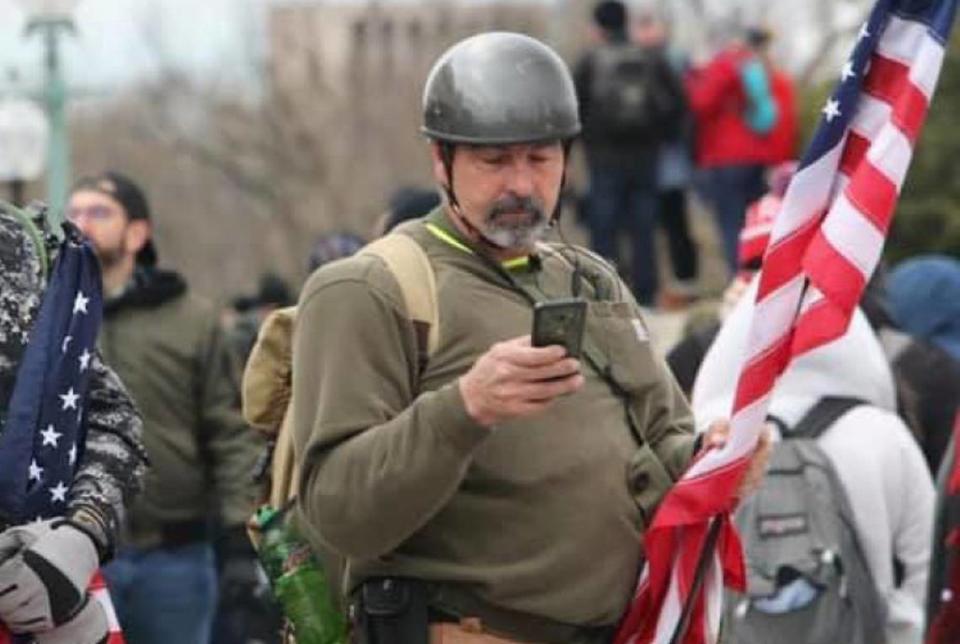
Video and photos of Loganbill taken inside the Capitol showed him refusing to obey law enforcement commands, court records said. They also showed Loganbill wearing a gas mask and helmet, and prosecutors said he arrived at the Capitol “dressed for war.” Investigators said he told them he initially brought the gear because he was fearful Antifa was going to infiltrate the protest, then wore those items after police deployed tear gas.
On Nov. 16, U.S. District Judge Amy Berman Jackson conducted a bench trial and found him guilty on all charges.
Kennedy was indicted by a federal grand jury on July 23, 2021, on felony charges of civil disorder and obstruction of an official proceeding, along with four misdemeanors. A second superseding indictment handed down in February added a felony charge of tampering with records, documents or other objects.
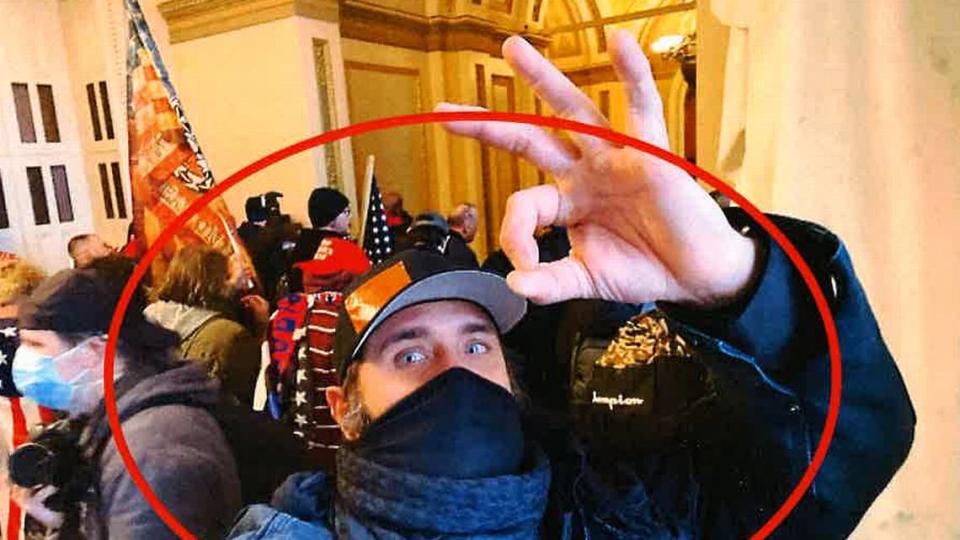
According to court testimony, Kennedy met up with several Kansas City-area Proud Boys in downtown Washington, D.C., on Jan. 6,and was among the first group to breach the police barriers on the Capitol’s west side.
Once inside, Kennedy was nearby when Vice President Mike Pence was evacuated from the Senate chamber and was part of a crowd pushing to get through a barricaded door into the House chamber. Kennedy wiped his iPhone clean after learning that federal authorities were seeking information about people who entered the Capitol that day.
Kennedy pleaded guilty April 3 to one count of civil disorder and one count of tampering with records, documents or other objects. He also was found guilty by a judge of obstruction of an official proceeding based on an agreed set of facts between the government and Kennedy’s attorneys.
Todd was charged on May 3, 2022, with four misdemeanor counts after he was allegedly captured on video making threatening remarks to police officers and illegally remaining within the building.
Body-worn camera footage obtained from the Metropolitan Police Department showed Todd yelling at law enforcement authorities. “At one point inside the rotunda, while near a law enforcement officer, Todd yelled, ‘I swear to God, I’ll hip toss your ass into the f------ crowd, mother ------!’” court documents said.
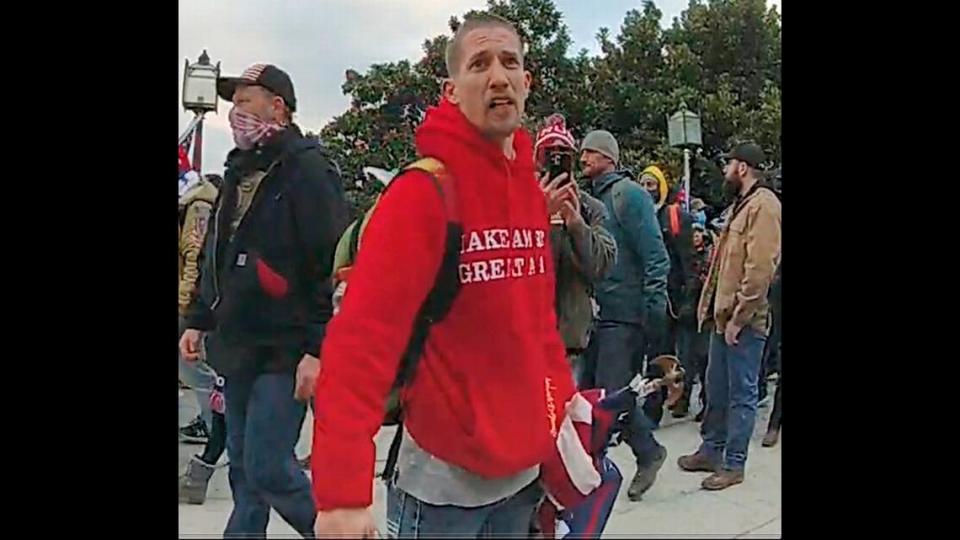
His case was originally scheduled to go to trial Nov. 14, 2022. But after he was granted more time to prepare, a grand jury indicted him on felony counts of assaulting, resisting or impeding certain officers that inflicted bodily harm and obstruction of an official proceeding in addition to the four misdemeanor counts.
Todd’s jury trial began on Jan. 29. After a weeklong trial and three days of deliberations, he was found guilty on all six counts. Records show he is being held in the D.C. Jail until his sentencing.
Pope was arrested Feb. 12, 2021, and faces two felonies — civil disorder and obstruction of an official proceeding — and several misdemeanors. Among the allegations is that he tried to force open a door inside then-House Speaker Nancy Pelosi’s office suite.
In August 2022, a federal judge ruled that Pope would be allowed to represent himself in his case. Since then, he has been fighting for access to U.S. Capitol Police security videos from Jan. 6 that he says include footage of undercover Metropolitan Police officers inciting protesters to breach the Capitol on Jan. 6.
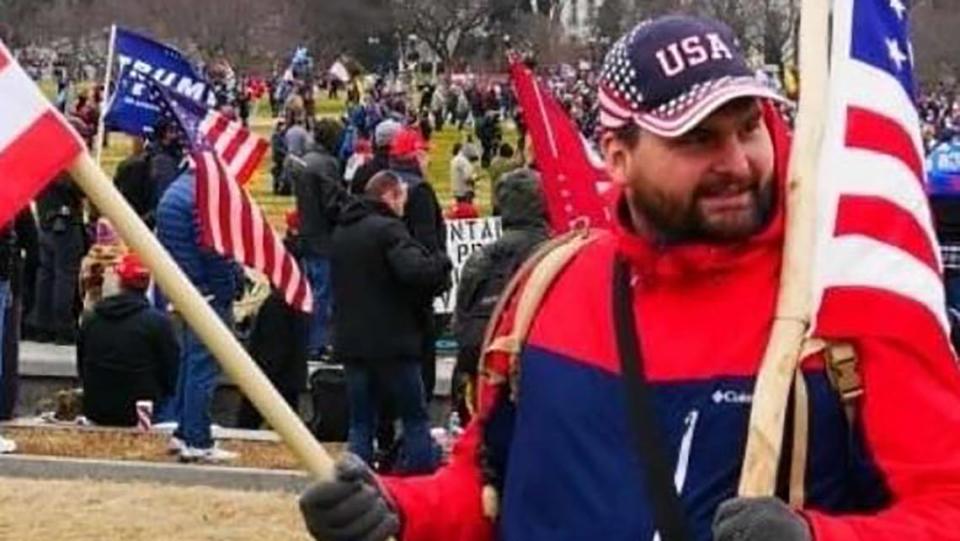
On Sunday, Pope filed a motion to continue his trial from the July 22 date. Among his arguments for doing so, he said, was that “there is a strong possibility that the Supreme Court ruling will alter the outcome of my case.”
If the Fischer decision is handed down at the end of June and the court rules that the obstruction charge is inappropriate in Capitol riot cases, Pope said, he would have to file a last-minute motion to dismiss the obstruction charge against him while also preparing for his trial.
“I will also take very different strategic approaches to my defense, depending on the Supreme Court’s ruling, including which witnesses I call to testify,” he said.
In addition, Pope said in Sunday’s filing, if the Supreme Court rejects the government’s use of the obstruction charge in Jan. 6 cases, prosecutors “may be more open to engaging in a more reasonable discussion about pretrial resolution.”
“But if that happens,” he said, “I will need time to hear and consider their position.”

